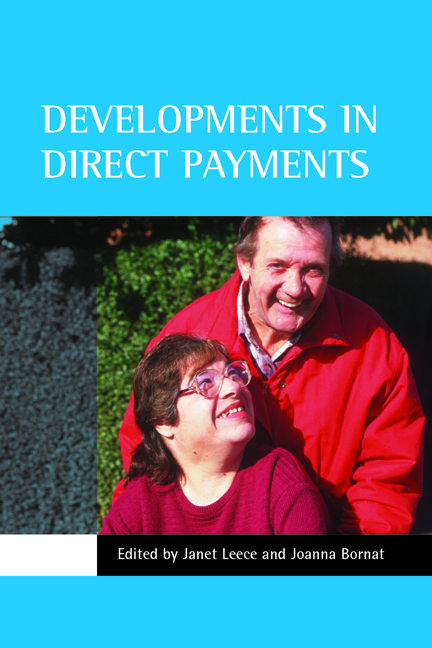Book contents
eleven - The Direct Payments Development Fund
Published online by Cambridge University Press: 18 January 2022
Summary
Background
The Direct Payments Development Fund is £9 million of Department of Health (DH) money, allocated over three years, for the purpose of improving the take-up of direct payments, through encouraging investment in direct payments support services.
Unlike other special funds set up to support policy initiatives (the Carers Grant, for example) it was decided to spend it through grant aid to voluntary organisations, rather than allocating directly to local authorities. To qualify for the grant, organisations had to show they were working in partnership with their local authority, and that there was a local implementation plan for direct payments. Crucially, given the short-term nature of the funding, they also had to have an exit strategy.
The DH hoped this would enable voluntary organisations to play a significant role in the development and promotion of direct payments.
It decided to make the grants in two rounds, giving each project 18 months’ worth of funding. A key condition of funding was that the organisation had the commitment of its local authority, to support the project, and work in partnership on it.
Projects had to show they had a workable, innovative plan to increase take-up, either for all users or for a selected group. They had to say how they would promote the project and disseminate its findings, and how they would work with a local multi-agency implementation group.
The grants
Before grant making to local organisations started, a single national grant was made, to the National Centre for Independent Living (NCIL), of £280,000 for each of three years. One of the conditions of this grant was that NCIL would evaluate the other projects supported by the Fund.
In round one, 43 grants were made. They ranged in size: the largest single grant was to the Rowan Organisation (£400,574) for work in eight authorities. There were 19 grants of just over £100,000, including three to one organisation, Choices. Of the others, the smallest grant was £40,408.
Round one grants ran from September 2003 to March 2005. It was decided to overlap the grants for round one and round two, starting round two projects in September 2004, so that they would be finished by the end of March 2006.
- Type
- Chapter
- Information
- Developments in Direct Payments , pp. 149 - 158Publisher: Bristol University PressPrint publication year: 2006

